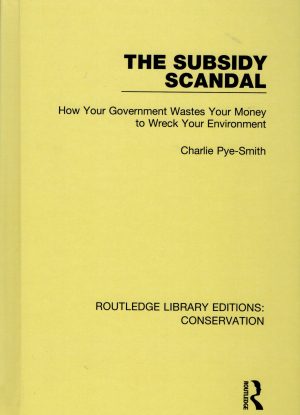The Subsidy Scandal
In December 2019, Routledge re-issued The Subsidy Scandal: How Your Government Wastes Your Money to Wreck Your Environment, first published by Earthscan in 2002. Here is the preface I wrote for the new edition.
Some 20 years ago, Lloyd Timberlake, one of the most astute writers on environmental issues, invited me for lunch in London. Lloyd and I had first met when we worked together at Earthscan, in the days when Earthscan operated under the umbrella of the International Institute for Environment and Development (IIED). He had recently left the UK to work for an American foundation, AVINA, based in Miami, Florida. He wanted to know whether I would be interested in writing an exposé about the vast sums of money allocated by governments to activities which had a damaging impact on the environment. Lloyd had already commissioned a study – Addicted to Subsidies: How Governments Use Your Money to Destroy the Earth and Pamper the Rich – but this was a dry, specialist report and its message was unlikely to reach a wide public or the politicians who consistently voted in favour of perverse subsidies. What was needed, suggested Lloyd, was a travelogue through this world of economic absurdities.
A couple of months later, I set off for North America and over the course of a long summer I spent time with scores of people benefiting from state-sponsored largesse, including the beneficiaries of sugar subsidies in Florida, logging subsidies in Alaska, ranching subsidies in Montana, gas subsidies in Michigan, road-building subsidies in West Virginia, fisheries subsidies in Newfoundland and mining subsidies in New Mexico. I also spent time with the individuals and organisations fighting against the subsidies, sometimes at considerable risks to their own safety. I was treated with great kindness wherever I went and frequently ended up liking people who detested one another.
I concluded, as you might expect, that the sooner governments did away with perverse subsidies the better. For one thing, they were costing taxpayers a fortune. In the early 2000s, four sectors – farming, road transport, and the energy and water industries – received more than US$700 billion a year in subsidies. Just as significantly, the subsidies were wrecking the environment in a multitude of ways. Forests were being felled, rivers polluted, wildlife ravaged, the oceans plundered.
My focus was very much on the US and in the final chapter of The Subsidy Scandal I concluded there was not much hope of reducing subsidies while the current political system prevailed. The grim truth is that then, as now, politicians without campaign funds and political parties without bulging bank balances were doomed to failure. Corporations and companies provided millions of dollars to congressional candidates. This helped to ensure that billions of dollars of subsidies kept coming their way. And politicians colluded in this absurd business, even when they knew it made no sense. For example, politicians in Florida would vote in favour of timber subsidies to Alaska and mining subsidies for Montana, providing politicians from Alaska and Montana voted for their sugar subsidies.
The Subsidy Scandal was written as a travelogue. I wanted to entertain the reader. But I also wanted to have some influence – to encourage people in positions of power to think differently, to question and oppose the fiscal lunacy of dishing out huge amounts of money to businesses which destroyed the environment. In that sense, the book was almost certainly a failure.
In 2019, the Intergovernmental Science-Policy Platform on Biodiversity and Ecosystem Services (IPBEG) issued a report which suggested that up to a million species are threatened with extinction because of human activities, with perverse subsidies being a key driver. According to the report, subsidies to the fossil fuel industry amount to around US$345 billion a year. However, if you factor in externalities that are not included in the price of fuel, such as environmental destruction, pollution and illnesses related to the burning of fossil fuels, the cost comes to over US$5 trillion. This is a staggering figure.
“We need to reduce and eliminate harmful subsidies,” said Sir Robert Watson, the British scientist who chairs the IPBES, when launching the report. “We really have to think about what is the economic system that would be much more sustainable in the future.” Whatever it is, it will be one where perverse subsidies, such as those described in The Subsidy Scandal, are dramatically reduced or abolished. Although it is now 20 years since the book was published, I still believe that the stories told here have a strong resonance, for the simple reason that most of the subsidies I wrote about remain in place. That, in itself, is a tragedy. It shows how little has been achieved.
Charlie Pye-Smith, London, August 2019
